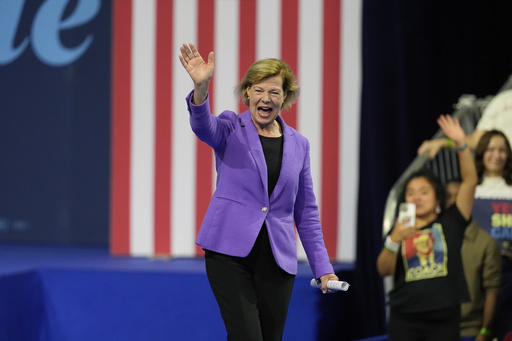
MADISON, Wis. — Eric Hovde, a Republican candidate for the Senate in Wisconsin, has faced scrutiny for his admitted unfamiliarity with the U.S. farm bill in the final stretch of his campaign. During a recent debate, Hovde stated he is “not an expert” on the significant legislation that affects the agricultural community in a state renowned for its dairy production.
This controversy arose following the endorsement of incumbent Senator Tammy Baldwin by the Wisconsin Farm Bureau, which is traditionally aligned with the Republican Party. This marks a pivotal moment, as it is the first time in over two decades that a Democratic candidate has won this backing for a statewide office.
With both candidates claiming the race is extremely close, the stakes are high, considering control of the Senate could hinge on the outcome. Democrats are defending 23 seats while Republicans have just 11 seats on the ballot this election cycle.
During the sole debate with Baldwin on October 18, when questioned about the farm bill, Hovde remarked, “I’m not an expert on the farm bill because I’m not in the U.S. Senate.” Baldwin has since leveraged these comments in her advertising campaigns, emphasizing her endorsement and asserting that Hovde “doesn’t give a damn about farmers.”
Since then, Hovde has stood firm in his stance, questioning the relevance of his knowledge of the farm bill while he is not an incumbent senator. “Why in God’s green Earth would I know all the details of a farm bill when I’m not serving in this Senate right now?” he told reporters after voting on Tuesday.
He described the criticism he has received regarding his debate response as “absurd.” Hovde explained, “I answered. I said the issue with the agricultural bill is that only about 20% of it is for farmers. I believe farm bills should focus on farmers and not on large corporate interests.”
In a conservative radio show appearance, Hovde expressed frustration over the debate questions posed by the Wisconsin Broadcasters Association. He questioned, “Am I supposed to have studied the agricultural bill in depth? My answer is correct: the agricultural bill is no longer primarily about farmers. They label it as the farm bill, but only about 25% is allocated for farmers.” He lamented that the bill has shifted towards benefiting big corporations and alternative programs such as food stamps.
During a campaign rally in Eau Claire, Hovde challenged Baldwin on her knowledge of the farm bill, claiming, “If she were asked about what’s in the farm bill, she wouldn’t have a clue.” He elaborated that it is unrealistic to expect detailed knowledge of a complex bill that he described as “a big grab bag” of spending.
In response, Baldwin maintained that the farm bill is essential for providing stability to Wisconsin’s agricultural sector. “Farmers need consistency that a farm bill offers,” she asserted. Baldwin pointed out that a critical issue with the current farm bill is its bipartisan struggle, particularly the House Republicans’ draft, which she claims undermines nutrition programs that are crucial for agricultural support.
The last farm bill was approved in 2018 and was initially set to conclude at the end of 2023; however, due to the inability of Congress to reach a reauthorization agreement, it has been extended for an additional year.
